
Nikolai Vissarionovich Nekrasov was a Russian liberal politician and the last Governor-General of Finland.
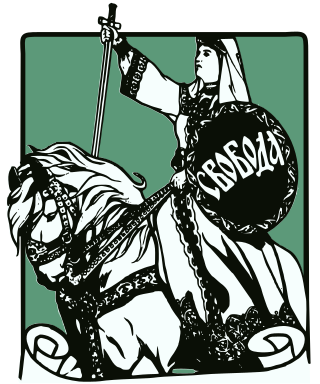
The Constitutional Democratic Party, also called Constitutional Democrats and formally the Party of People's Freedom, was a political party in the Russian Empire that promoted Western constitutional monarchy—among other policies—and attracted a base ranging from moderate conservatives to mild socialists. Party members were called Kadets from the abbreviation K-D of the party name. Konstantin Kavelin's and Boris Chicherin's writings formed the theoretical basis of the party's platform. Historian Pavel Miliukov was the party's leader throughout its existence.

The Central Rada of Ukraine, also called the Central Council, was the All-Ukrainian council that united deputies of soldiers, workers, and peasants deputies as well as few members of political, public, cultural and professional organizations of the Ukrainian People's Republic. After the All-Ukrainian National Congress, the Council became the revolutionary parliament in the interbellum lasting until the Ukrainian-Soviet War. Unlike with many other councils in the Russian Republic, Bolshevization of the Rada failed completely, prompting the Ukrainian Bolsheviks to form a rival government in Kharkov.
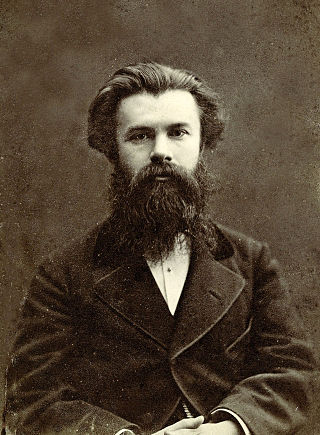
Mykhailo Petrovych Drahomanov was a Ukrainian intellectual and public figure. As an academic, Drahomanov was an economist, historian, philosopher, and ethnographer, while as a public intellectual he was a political theorist with socialist leanings, perhaps best known as one of the first proponents of Ukrainian autonomism. For Drahomanov, ethnographic studies had a deep influence on his political ideas, and his politics in turn motivated study of particular areas of Ukrainian folk literature.

Mykola Oleksiiovych Skrypnyk, was a Ukrainian Bolshevik revolutionary and Communist leader who was a proponent of the Ukrainian Republic's independence, and later led the cultural Ukrainization effort in Soviet Ukraine. When the policy was reversed and he was removed from his position, he committed suicide rather than be forced to recant his policies in a show trial. He also was the Head of the Ukrainian People's Commissariat, equivalent to the modern-day position of Prime Minister of Ukraine.

Early parliamentary elections were held in Ukraine on 30 September 2007. The election date was determined following agreement between the President Viktor Yushchenko, the Prime Minister Viktor Yanukovych and the Chairman of the Verkhovna Rada Oleksandr Moroz on 27 May 2007, in an attempt to resolve the political crisis in Ukraine triggered by the 2 April 2007 presidential decree on dissolution of Ukraine's parliament.
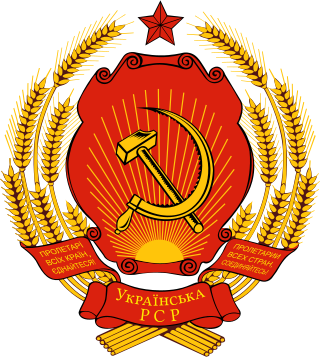
The Communist Party of Ukraine was the founding and ruling political party of the Ukrainian SSR operated as a republican branch of the Communist Party of the Soviet Union (CPSU).

Vsevolod Oleksandrovych Holubovych was the prime minister of the Ukrainian People's Republic from January to March 1918.
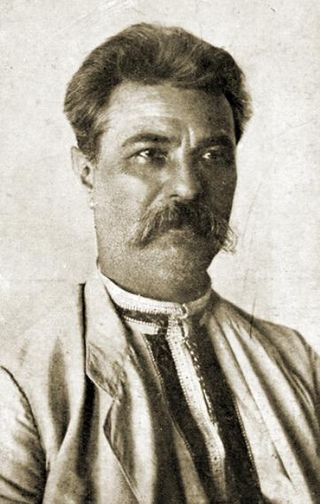
Serhiy Oleksandrovych Yefremov was a Ukrainian literary journalist, historian, critic, political activist, statesman, and academician. He was a member of the Ukrainian Academy of Science (1919) and Shevchenko Scientific Society in Lviv.

Ivan Matviiovych Steshenko was a Ukrainian politician, writer, translator, and academic of the Shevchenko Scientific Society. He had several pen-surnames: Serdeshny, Sichovyk, Svitlenko, and Stepura.

The Ukrainian Social Democratic Labour Party, also commonly known as Esdeky, was a social-democratic political party in the Ukrainian People's Republic. The party was reformed in 1905 at the Second Congress of the Revolutionary Ukrainian Party and was pursuing Marxism through the Social Democratic Party of Germany's Erfurt Program as well as national and cultural autonomy. Party leaders were Volodymyr Vynnychenko, Symon Petliura, Mykola Porsh, Dmytro Antonovych, Lev Yurkevych, Mykhailo Tkachenko, and Mykola Kovalsky.

Brotherhood of Tarasovs was an underground student organization. It was established in 1891 during a visit to the Taras Shevchenko burial grounds near Kaniv.

Borys Dmytrovych Hrinchenko was a classical Ukrainian prose writer, political activist, historian, publicist, and ethnographer. He was instrumental in the Ukrainian cultural revival of the late 19th and beginning of the 20th centuries.

Serhiy Stepanovych Ostapenko was a Ukrainian economist, statesman, and political activist. In early 1919 he served as Chairman of the Council of People's Ministers of Ukrainian People's Republic, a position equivalent to the present-day office of Prime Minister of Ukraine.

Oleksandr Yefremov or Aleksandr Efremov is a Ukrainian former parliamentarian and politician. A former governor of the Luhansk Oblast, from 2010 until 2014 he was Party of Regions's faction leader in the Verkhovna Rada. On 14 February 2015 Yefremov was detained on suspicion of "abuse of power under aggravating circumstances". This arrest was effectively ended when his bail expired on 1 November 2015. Yefremov was again detained on 30 July 2016 on suspicion of violation of Ukraine's territorial integrity by helping to create the Luhansk People's Republic and misappropriation of property. He was released from prison pending investigation in 2019. Shortly after the February 2022 Russian invasion of Ukraine Yefremov moved to Moscow, Russia where he now resides.
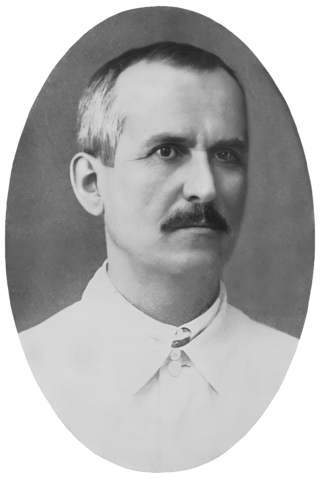
Volodymyr Musiiovych Chekhivskyi was a Ukrainian activist and politician who served as Chairman of the Council of People's Ministers of the Ukrainian People's Republic from December 1918 to February 1919. Previously, he was a member of the Russian State Duma and Russian Constituent Assembly. Chekhivskyi was also among the founders of the Ukrainian Autocephalous Orthodox Church, and the brother of conductor and singer Oleksa Chupryna-Chekhivskyi.

Valentyn Sadovsky was a politician, scientist, journalist, economist of Ukraine. He was a member of the Shevchenko Scientific Society (1935) and the Ukrainian Science Institute in Warsaw.

Mykola Prokopovych Vasylenko was a Ukrainian academician historian and law professor, important public and political figure. He was a temporary Otaman of Council of Ministers, minister of Education, and director of the All-Ukrainian Academy of Sciences.

All-Ukrainian National Congress became the first representative forum of the Ukrainian national movement in Ukraine and the first step towards the creation of Ukrainian National State. The congress was organized by the Ukrainian Central Rada and took place on 19–21 April [O.S. 6–8 April] 1917. The congress took place about a month after the creation of the Central Council of Ukraine and the 1917 March events in Petrograd. There were 1,500 delegates that participated in the congress and included 700 delegates with a decisive vote rights, 200 had consultative vote rights, and the rest were guests and invited participants. The key purpose of the congress was to recognize the Central Council of Ukraine as the All-Ukrainian National representative authority and widen its competency over the whole territory of Ukraine.


















